Whether indoors or out, the air you breathe matters.
When you breathe in poor quality air full of pollutants and particles, it can affect your health and overall respiratory system. This is especially true with conditions like asthma which is aggravated by poor air quality.
There may even be more pollutants inside your home than outside.
Stale air and suspended particles in small spaces can accumulate and greatly affect your overall health and well-being.
Air purifiers can clean the air and improve the air quality inside your home. These gadgets can help improve your home’s ventilation and air circulation by cleaning and freshening the air you breathe.
For even better results, choose a quiet air purifier so you get more bang for your buck! Purchasing one of these gadgets is an investment worth considering so you can improve the overall airflow in your home and improve the quality of air, too.
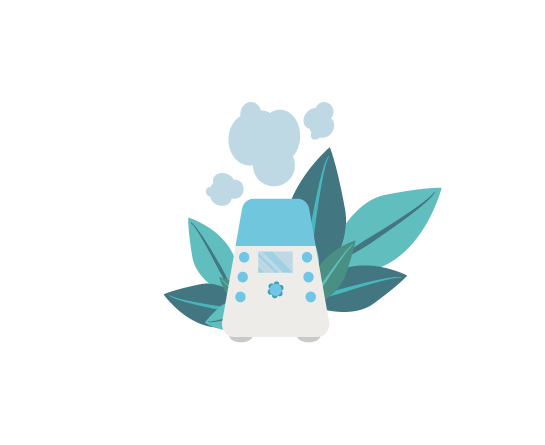
Your Guide to the Best and Quietest Air Purifiers
To help you get started on your search for the right air filters and purifiers here is some information you’ll want to know.
We’ll discover the value of having an air purifier and why it can make such an important influence on your life. We’ll also help you take the next step in choosing the right air purifier for your space, along with addressing several factors you should keep in mind as you make your selection.
Do you want to breathe better in your home? Let’s get started in answering some of your top questions about air purifiers.
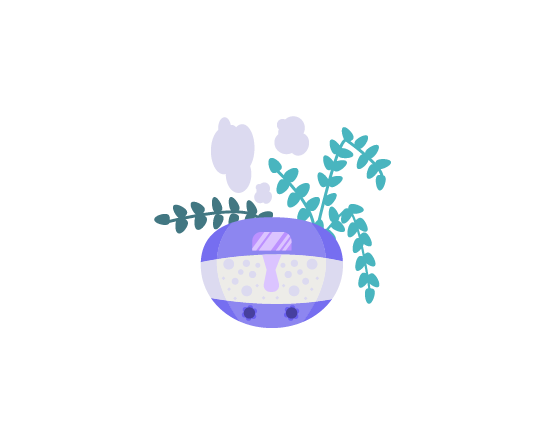
Why are Air Purifiers Important?
Before you jump into investing in a quality air purifier, it’s important to understand its value to your health and overall well-being.
These gadgets reduce the build-up of potentially harmful pollutants and keep air fresh when outside cross-breezes aren’t possible.
They also bring a variety of benefits, whether you suffer from respiratory conditions or not. They can be used in a variety of locations, from apartments to standard homes to larger buildings. No matter where you live and work, especially while sleeping at night, you should be able to breathe clean and purified air that’s great for your health.
Do They Work?
Depending on the type of air purifier you select, these can be extremely effective at removing harmful contaminants in the air.
Typically, air purifiers use a filter or several filters. The unit also has a fan that brings in and circulates the air through the filters. When air is pushed through the unit, the filters capture particles and other pollutants, resulting in clean, purified air. Stale air becomes refreshed and cleaned.
This cycling of air through the filters helps trap particles in the filters. These filters are what make the air purifier effective and efficient. As you use an air purifier, you’ll want to regularly inspect and care for the air filters, cleaning or replacing them as necessary.
What Do They Filter Out?
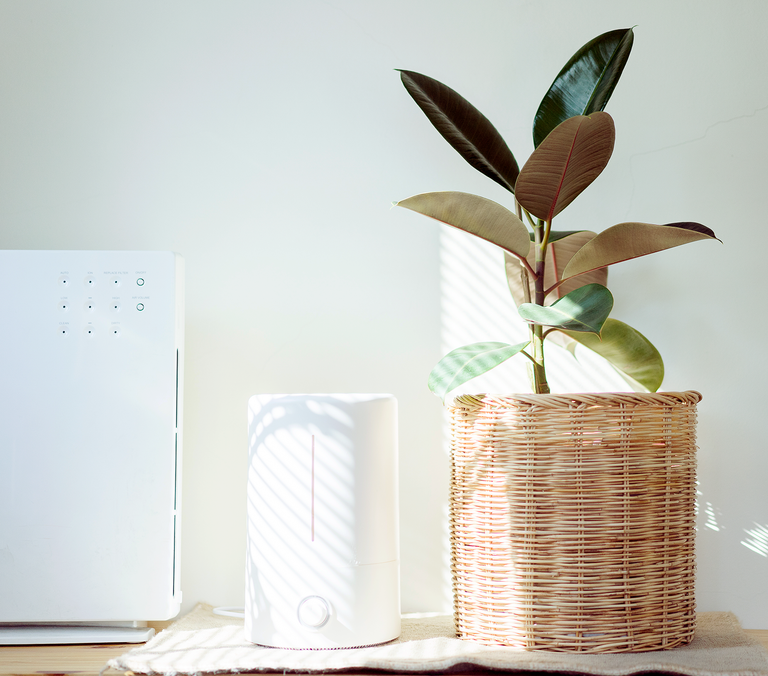
Typically, air purifiers work to target the removal of smoke, dust, and odors. If you have a pet, it can also be effective in removing pet dander.
Keep in mind that not all air purifiers are necessarily designed to remove pollutants in gaseous form. These include gases like radon or other volatile organic compounds in gas form. They do not always take care of those gases that result from things like paints or cleaning products that can be harmful as well.
Their Benefits
Using an air purifier has several benefits. Whether you already struggle with respiratory issues or not, air purifiers can transform the air you breathe and support your overall health.
- Alleviate asthma – Asthma symptoms can be alleviated when the air quality improves. Often, asthma conditions can become more apparent when those suffering from it inhale additional pollutants like pollen or dust. These particles can remain suspended in the air if one does not use a filter. With a purifier, those particles are removed and people may find it easier to breathe. Breathing becomes less difficult or asthma attacks are lessened.
- Eliminates odors – Do you recognize the smell resulting from the use of aerosol sprays, paints, or other air sprays? An air purifier can get rid of those. These Volatile Organic Compounds (VOCs) can cause serious effects such as nausea and breathing difficulties. An air purifier can get rid of those odors that cause unpleasant environments so you can inhale only the freshest air.
Some chemicals such as gasoline, benzene, and formaldehyde break down at room temperature causing an off-gassing odor. These chemicals, called Volatile organic compounds (VOCs), are commonly found in paints, aerosol sprays, upholstered furniture, or air fresheners. The odor from VOCs can cause nausea, breathlessness, and even affect your cognitive functions.
https://amerisleep.com/blog/benefits-of-an-air-purifier/
Other NIH studies show low VOC levels in ambient air improves productivity and performance. Air purifiers with HEPA and activated carbon filters are effective in trapping gases as well as particles, reducing pollutants in the indoor environment.
If you have guests coming over, you don’t have to worry about the smoke or the odor of cooking oil and spices bothering them. The air purifiers absorb all the smell, making your room fresh and clean.
- Reduce the risk of airborne disease – Many diseases are airborne, meaning they are transmitted through the air. With an air purifier, those pathogens can be removed. This is especially important in preventing diseases from spreading in homes or common living areas.
- Sleep better – With fewer pathogens floating in the air at night, you can also sleep better with an air purifier. As particles like allergens can trigger adverse symptoms and reactions like sneezing, those symptoms can interrupt your ability to sleep soundly. With better sleep, you’ll also experience benefits like improved mood and the ability to function better.
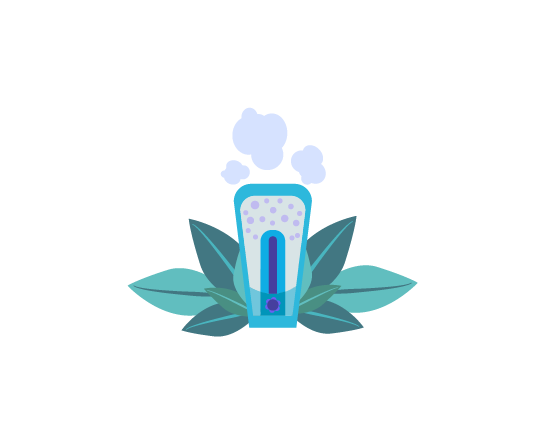
Types of Air Purifiers
When it comes to finding the right air purifier for you, there are a lot to choose from. They come in a range of features and functions based on the setting. Some may have more advanced filtering systems that may be more effective at removing particles including gases.
- HEPA Technology Air Purifiers – Most often, air purifiers will have High-Efficiency Particulate Air (HEPA) filters. These purifiers and filters can remove particles that are as small as 0.3 microns from the air. That means it catches particles that you can’t even see. As the air passes through the fibers of the HEPA filter, it gets caught and eliminated from the air that is pushed out. While these may be effective at removing particles in the air, they may not pick out odors or other gases.

- UV Technology Air Purifiers – This type of air purifier doesn’t eliminate airborne particles as a HEPA filter does. Instead, it is designed to eliminate airborne pathogens like viruses and bacteria that can linger in the air. It works by destroying the pollutants into something that’s not harmful, such as water and CO2. Several factors may determine the effectiveness of this type of air filter, such as location and surroundings. As this type doesn’t eliminate airborne particles like dust and pollen, it’s often used in conjunction with a HEPA filter air purifier.

- Carbon Technology Air Purifiers – Carbon technology is another method filters that absorb and catch pollutants like odors and smoke. With its ability to remove odors and other chemicals, it helps purify the air for people who are sensitive to chemicals or have conditions like asthma. And, since the captured particles aren’t released back into the air, the air remains uncontaminated.

With technological advancements, air purifiers now come with a variety of features and options that can be best used based on the environment it’s designed to purify. Whichever method you choose, you can be confident that the air you’re breathing will be healthier and fresher.

How Does a Quiet Air Purifier Work
A key component of choosing the right air purifier is the noise it produces when it is running. Typically, all HEPA air purifiers produce some noise as they run since the air is forced through a compact space. Older models tend to produce louder sounds as they run while newer ones can be quieter.
Amerisleep says that most purifiers with HEPA filters have a noise volume that ranges from 35 to 70 decibels. The volume or intensity of noise may depend on the speed settings your unit uses as it runs.
Most air purifiers with HEPA filters produce noise ranging from 35 to 70 decibels. The noise level depends on your operational settings. To avoid sleep disruptions due to noise, opt for air purifiers which are effective even set to a lower noise level.
https://amerisleep.com/blog/benefits-of-an-air-purifier/
For spaces where the noise of the unit may be an issue, try to find a unit that is advertised and designed to reduce noise as much as possible to fit your family’s needs.
A quiet air purifier works the same way as regular air purifiers, using more advanced technology to reduce the noise levels as much as possible. Units like these can be great for bedrooms where noise may be more of a concern.
Are Air Purifiers Safe to Use Around Children and Pets?
With their design at removing harmful particles in the air, air purifiers are generally very safe to use in all sorts of settings. Air purifiers like those with HEPA filters or activated carbon filters can be great options to be used around young children and pets. As you use them, be sure to place them in a location where they won’t be touched by children or pets and accidentally damage the unit or themselves.
However, if you have an ozone air filter that emits ozone to eliminate particles, use extreme caution, particularly around children and pets. These varieties can cause harmful side effects like shortness of breath and should be used with great care.
Help With Cigarette Smoke
To prevent the risk of second-hand smoke and improve living spaces overall, an air purifier can help eliminate airborne particles and smoke. Because the smoke particles are so microscopic, many air purifiers use several levels of air filtering, including using either UV light technology or other chemical-removing processes. These options tend to be more effective at eliminating VOCs in addition to larger particles like dust or pollen.
Help With Pet Allergies
If you have a pet that brings dander, dust, and pollen with it, an air purifier can be very helpful in addressing those allergy-causing particles. As pet dander is the most common cause of pet allergies, an air filter can be very effective in filtering out that dander and alleviating allergy symptoms. These filters can be of any variety, often a HEPA filter included.
Help During Wildfires
As with cigarette smoke, air purifiers can also help eliminate wildfire smoke from your home. Similarly, a UV light technology purifier is often most effective at eliminating gases, while a HEPA or carbon filter can help in eliminating particles in the air.
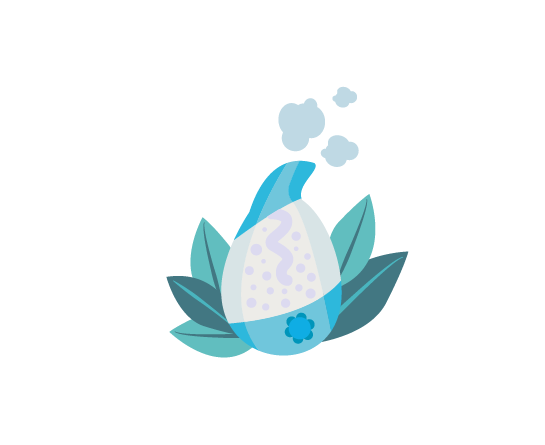
Choosing the Right Filter
For air purifiers to be effective, you need a good quality, reliable filter so these gadgets can function properly. Here are some things you’ll want to know when choosing the right ones.
Various Types of Air Filters
The filters included in air purifiers are what make them efficient and effective at removing harmful particles in the air. A good purifier needs a reliable filter. These filters can come in various materials to best keep pollutants out of your clean air. They can be made of a special paper, fiber – including fiberglass material – or mesh-like material.
Some filters may be able to be reusable, although they are not often found in common and effective air purifiers. These reusable ones can be washed as needed. However, they do require detailed care to prevent rips or other malfunctions. Typically, these reusable varieties tend to be more effective at eliminating larger particles from the air, things such as pollen, and other dust mites you can visibly see.
For more advanced filtering, you may be able to find filters that use ultraviolet light technology. These go a step further in eliminating harmful particles to include the removal of mold and bacteria you can’t even see. While the effectiveness of these filters may vary, they may be beneficial for your space.
Some filters are reusable and washable, but they require meticulous maintenance, so you don’t usually find them on the most effective air purifiers. Reusable filters are generally better at removing larger particles from the air, like dust mites and pollen.
https://www.goodhousekeeping.com/appliances/air-purifier-reviews/a25252001/do-air-purifiers-work/
You’ll also find UV (ultraviolet light) filters on the market, which often claim to destroy biological impurities like mold or bacteria, but many require higher wattage and greater exposure to be effective (not to mention some bacteria is UV-resistant).
What’s the Best Air Filter to Use
The best air filter to get will depend heavily on your setting and what you hope to eliminate. If you’re concerned with airborne particles like dust and pollen, a HEPA filter or a carbon filter that is either reusable or disposable can be very effective. However, if you’re looking to eliminate gases like radon or smoke, a filter that uses UV light may be more effective with your unit.
Like your living space, the type of air filter is unique to you. Do your research and discover what matters most to you in an air filter. Then, choose the filter and the unit that matches what you need.
How Often Do You Have to Change the Filter on Air Purifiers
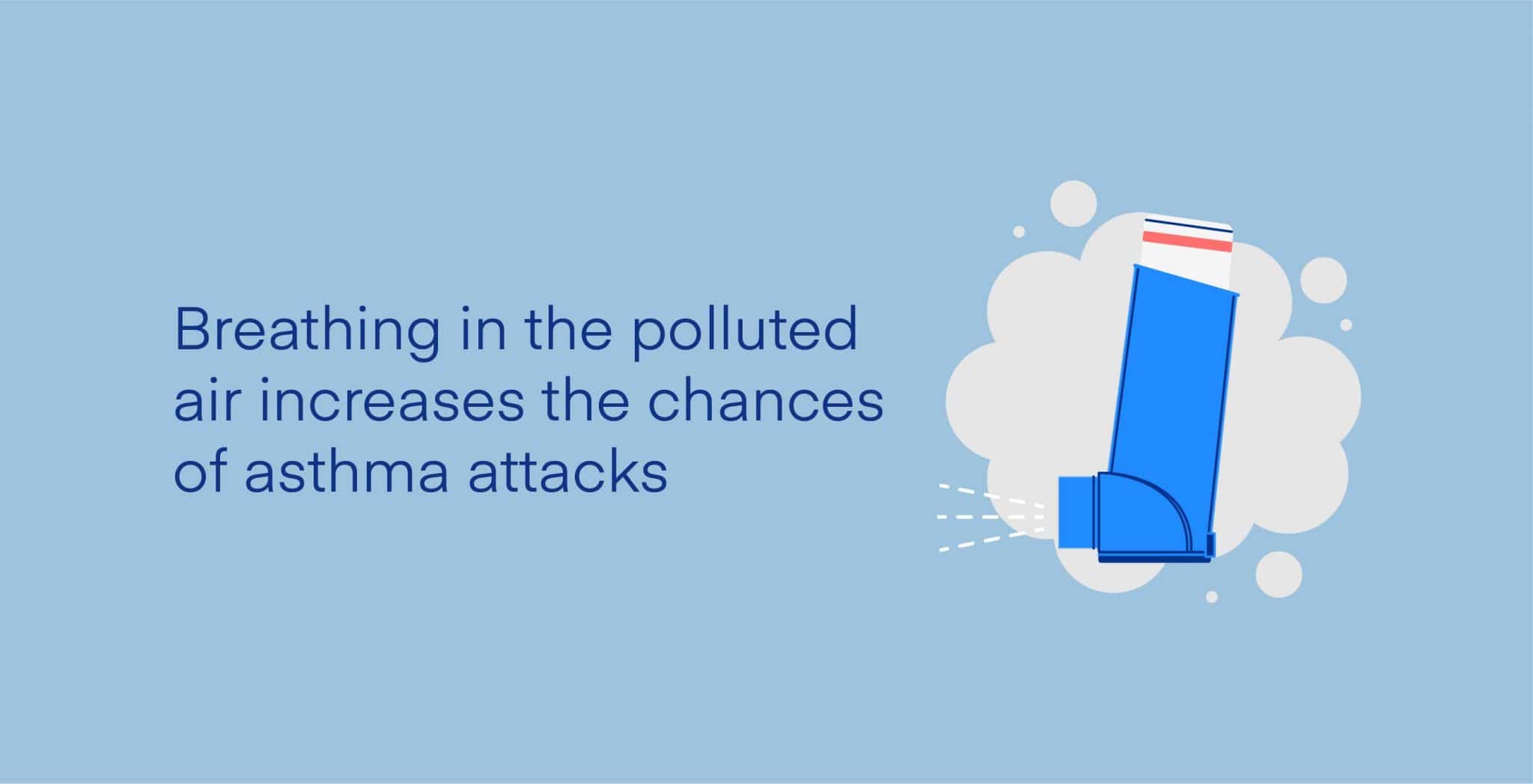
To keep your air purifier working as intended, it’s important to regularly replace and/or clean your air filters in the unit. Amerisleep suggests to replace HEPA filters should be replaced every three months if you have them in regular use. Depending on the brand and any additional features of the filters, they will usually cost you about $100 per year to replace the filters.
However, if you have an air purifier that uses several different filters, such as both a carbon filter and a HEPA filter, you may need to spend more on air filters as you need to replace both filters every three months. An air filter that uses a combination of filters may be more effective in eliminating particles in the air and improving overall quality, the cost and frequency of replacing filters should be taken into account as you invest in these gadgets.
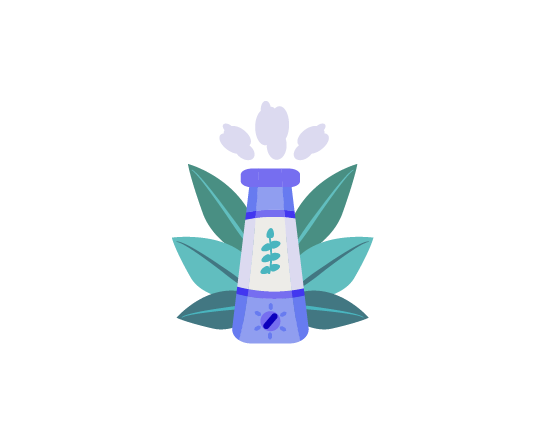
Finding the Right Air Purifier
In addition to the filtering system, you also want to be sure you select the right air purifier that’s designed for different personal spaces. Keep these factors in mind as you make your selection for your living space.
What Features Should You Look for in a Quality Air Purifier
As you begin your search for the right air purifier, there are a few factors to keep in mind. While you may think the price may be your only determining factor for your selection, it’s important to note that you tend to get more features and a higher quality unit with a higher price tag. The cost of regular maintenance such as replacing filters is also something to keep in mind. Know the room size in which you want to place your air purifier and understand what noise restrictions or preferences you have as you explore your options. For air purifiers that use promotional descriptions such as certified or energy stars, be sure you understand what those standards mean and determine if they’re important for you in the buying process. Setting these preferences in place can help you more easily find an air purifier that best meets your and your family’s needs.
Whole House vs. Small Air Purifiers
When determining which kind of air purifier is right for you, available space or the lack thereof is another consideration. A whole-house air purifier is much larger than one designed for a room or small apartment. Whichever kind you choose, you’ll want to put it in or have access to the rooms in which you spend the most time. Often, these include places like the bedroom or the living room. You can even find purifiers that are easily portable so you can move them as needed.
Keep Them Working Longer
With such an investment as an air purifier, you want to ensure you keep it running and serving its purpose for as long as possible. AchooAllergy provides several recommendations for getting the most out of your unit. These steps include having your air purifier on constantly. They also suggest leaving your unit in the same room rather than moving it to different locations often.

Keeping your unit properly maintained and regularly replacing filters can help extend its life as well.
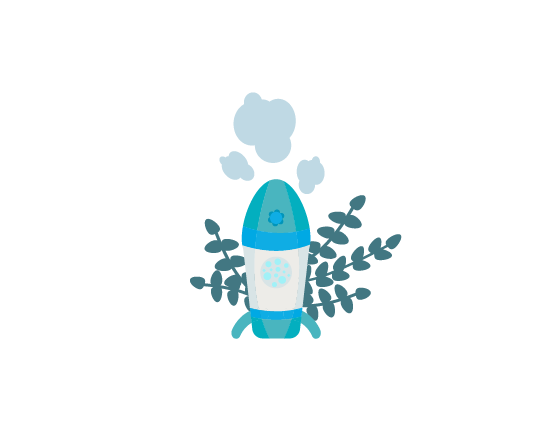
Other Ways You Can Improve the Air Quality in Your Home
Using an air purifier in your home is just one way you can improve the quality of air. With the importance of breathing in quality and fresh air, there are additional steps you can take alongside your air filter to ensure you breathe only the best. Other ways that you can improve the air quality in your home include activities like vacuuming the floors and carpets regularly. Vacuuming eliminates the dust, dirt, and other allergens that can build up over time with household activity. Picking up those particles from the carpets and floors and disposing of them can help to improve the air quality.
Another way to improve the quality of air in your home is by having indoor plants around. Just like the trees outside, plants can act as natural air filters. They dilute the carbon dioxide in the home and can contribute to fresher, cleaner air.
When the weather allows, give your air purifier a break and open up some windows to let some fresh air come through. Having ventilation in the home like with open windows can bring in fresh air naturally.
If you live in a particularly humid climate and find your home being hot and humid much of the time, you may want to consider adding in a dehumidifier to help alleviate that mold or mildew smell or growth you may encounter.
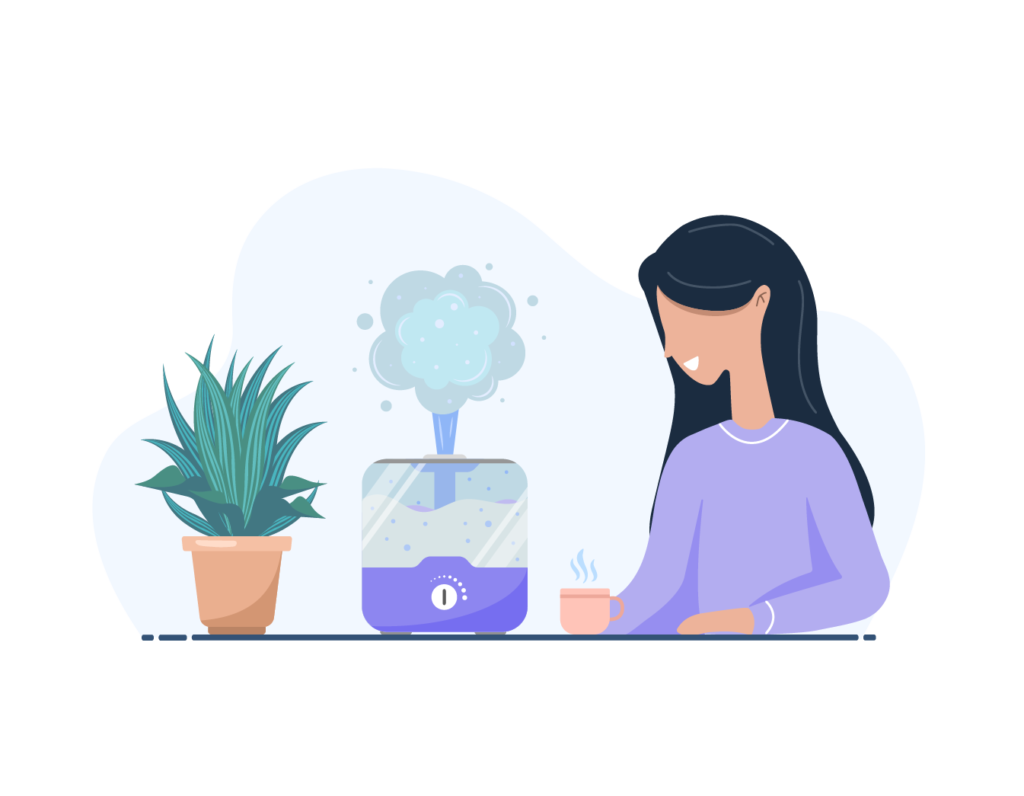
Popular Articles on ComproGear
How Long to Wear Compression Socks for Edema Swelling Compression Socks Before and After
Improve Air Quality at Home
Breathe better with the help of an air purifier. With its effective ability to remove large and small particles in the air, you can bring in fresh and cycled air to your home, rather than enduring the stale and stuffy air.
Use our guide to discover what kind of purifier and filter works best for your living environment and make the investment for your home or workspace. Whichever type you choose, take note of the speed settings and make sure to choose a quiet air purifier for even better results!
This page last updated December 15, 2022